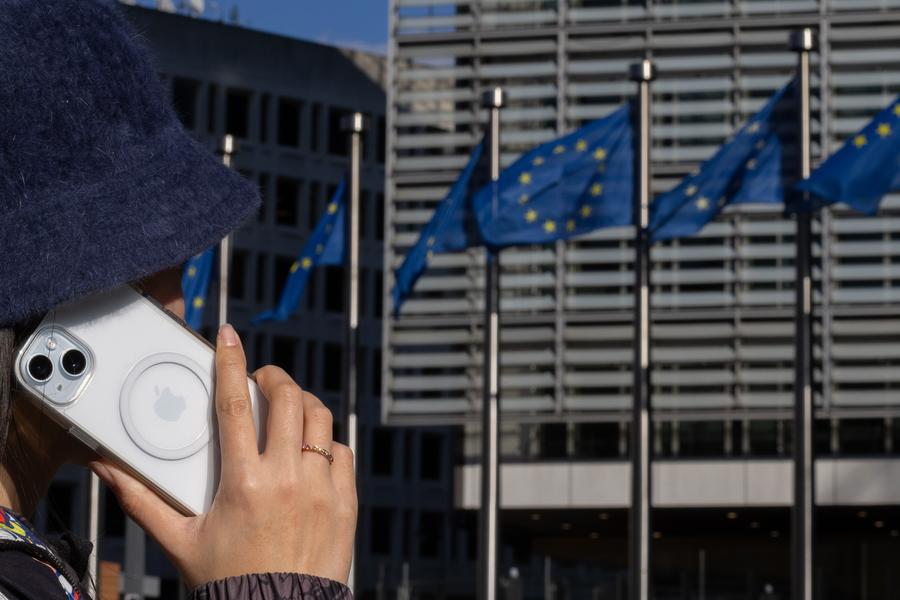
The European Union (EU) on Wednesday imposed fines totaling 700 million euros (798.7 million U.S. dollars) on American tech giants Apple and Meta, a move expected to intensify already strained transatlantic trade relations.
Apple received a 500-million-euro fine for preventing app developers from informing users about alternative purchasing options outside its App Store, violating the EU's Digital Markets Act (DMA) anti-steering provisions, according to the Commission.
Apple's rules hindered developers from fully benefiting from external distribution channels and restricted consumers from accessing potentially cheaper offers available outside the App Store, the Commission said in a statement.
Meta, the parent company of Facebook and Instagram, was fined 200 million euros over its "Consent or Pay" model introduced in 2023.
Under the system, EU users were required to either consent to the use of their personal data for targeted advertising or pay a monthly subscription fee for an ad-free experience.
The
Commission found that the model failed to provide users with a genuine,
less data-intensive alternative and did not sufficiently uphold their
right to freely consent to the processing of personal data. The
EU's decision marks the first enforcement action under the bloc's
landmark regulation, giving both companies 60 days to comply or face
periodic penalty payments. BIG TECH CRIES FOUL, CONSUMERS APPLAUD Apple
responded in a statement, accusing the European Commission of unfair
targeting. The company argued that the decision was detrimental to user
privacy, product security, and innovation. It
claimed to have spent "hundreds of thousands of engineering hours" and
made multiple changes in efforts to comply with the law, while accusing
the Commission of shifting goalposts "every step of the way." Meta pushed back strongly against the ruling, accusing the EU of attempting to "handicap successful American businesses." "This
isn't just about a fine; the Commission forcing us to change our
business model effectively imposes a multi-billion-dollar tariff on Meta
while requiring us to offer an inferior service," Joel Kaplan, Meta's
chief global affairs officer, said in a statement. The
Computer and Communications Industry Association (CCIA), which includes
both Apple and Meta as members, echoed the criticism, calling the
Commission's enforcement "opaque and discretionary," and warning that
the DMA risks becoming politicized. In
contrast, consumer rights advocates welcomed the penalties. Agustin
Reyna, director general of BEUC, Europe's leading consumer organization,
praised the DMA as a "gamechanger" for digital market competition. "Apple
and Meta have had ample time to comply with the DMA but instead have
delayed compliance and tried to twist the rules to their advantage,"
Reyna said. "Consumers deserve better choices, and businesses need
fairer market conditions." FINES AMID TRADE TENSIONS While
the fines are notable, they remain well below the DMA's cap of 10
percent of global annual turnover. Apple posted 391 billion dollars in
revenue in its last fiscal year, while Meta earned 165 billion dollars
in 2024. EU officials stressed that the 10-percent figure serves as a
maximum ceiling and that the fines reflected the relative newness of the
regulation and the short duration of the offenses. Although
Brussels has denied any link between the fines and broader U.S.-EU
trade tensions, analysts say the timing and moderation of the penalties
may be politically motivated. The Commission reportedly delayed the
announcement, originally expected in March, to avoid escalating
tensions. Giorgos
Verdi, a policy fellow at the European Council on Foreign Relations,
said the political timing of the decision matters, noting that U.S.
President Donald Trump views EU tech regulation as "overseas extortion." In
February, the White House warned in a memo that it would consider
retaliatory measures if EU regulators targeted American tech firms under
the DMA or the Digital Services Act (DSA), a law focused on policing
online content and disinformation. MORE ENFORCEMENT ON HORIZON Alphabet's Google and Elon Musk's social media platform X are reported to be next in line for potential penalties. In
July 2024, X was found in preliminary breach of the DSA for deceptive
interface design and limited transparency, but no fine has been issued
yet, prompting speculation that the delay is due to Musk's ties with
Trump. Meanwhile, pressure is mounting from
European lawmakers. The Socialists and Democrats (S&D), the European
Parliament's second-largest political group, urged the Commission to
conclude investigations into potential breaches by companies including X
and Meta. "As S&Ds, we are determined to defend our European
legislations. We will not water down our digital laws to appease those
who wage trade wars," said the political group on social media X. European
Commission President Ursula von der Leyen indicated earlier this month
that the EU is prepared to impose levies on U.S. digital firms if trade
talks with Washington collapse. In
an interview with POLITICO last week, von der Leyen emphasized that
tech giants should expect strict enforcement of EU rules regardless of
ownership or national origin. "The
EU's digital regulations have now become inevitably geopolitical,"
Verdi said. "Europeans are in need of a more comprehensive approach to
safeguard their technological sovereignty in a Trumpian era." (1 euro =
1.13 U.S. dollar)












